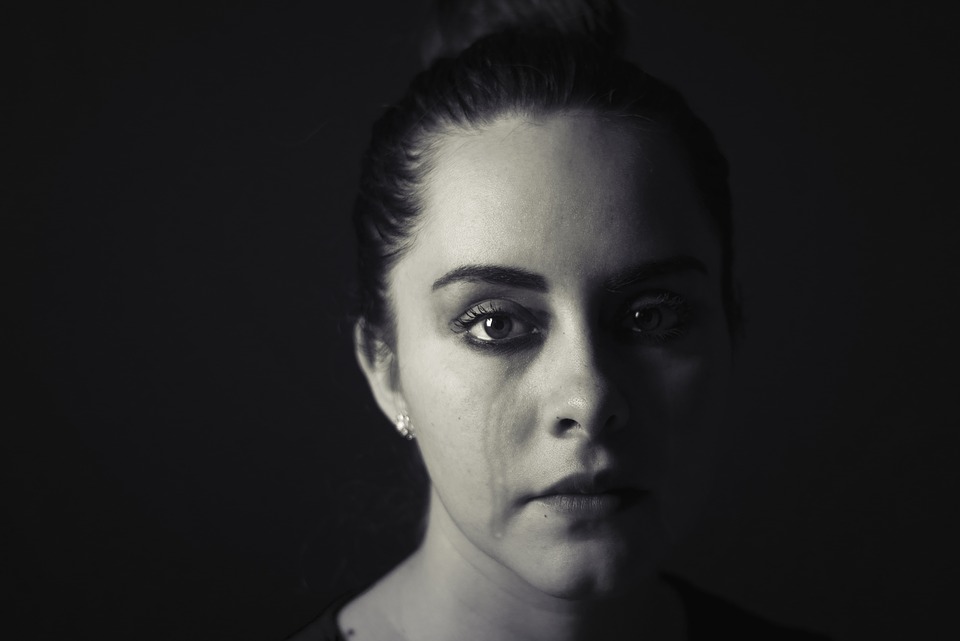Many veterans of all gender identities, sexual orientations, ages, racial and ethnic backgrounds, branches, and eras of service have reported suffering some type of military sexual trauma during their time of active military service.

This can bring with it prolonged and pervasive effects for many years to come. For veterans who struggle with processing the trauma they have experienced, the U.S. Department of Veterans Affairs makes available several different types of resources and services to help an MST survivor healthfully move in a positive mental health direction.
4 MST-Related Services Provided by the VA
- Designated MST Coordinator
- Outpatient Counseling
- Free Medical Treatment
- Services at Vet Centers
Military sexual trauma is a harmful life experience that can be difficult to process and move on from, but many veterans are successful at doing just that.
The VA offers an array of resources and services that help veterans get the help they need to cope and move forward. There are ways to cope with military sexual trauma that empower a veteran to take control of the symptoms that could arise from their trauma.
What Is Military Sexual Trauma?
Military sexual trauma, or MST, is the general term the U.S. Department of Veterans Affairs uses to describe any type of sexual harassment or assault suffered while on active duty military service. This includes any sexual behavior a military member is involved with against his or her will.
- Specific behaviors included in this definition include:
- Being pressured into participating in sexual activities
- Any sexual contact or activities that occurred without consent, including when the victim was asleep or intoxicated
- Being physically overpowered or forced to have sex
- Being touched or grabbed in a sexual way that made the victim feel uncomfortable, including during hazing experiences
- Comments of a sexual nature about the victim’s body or sexual activities that the victim found threatening
- Unwanted sexual advances or unwanted sexual touching that the victim finds threatening
The difficult reality is that military sexual trauma is fairly common, particularly among female service members. Surveys of veterans upon their separation from service reveal that one in three female veterans and one in 50 male veterans report suffering some type of military sexual trauma during their time of service.
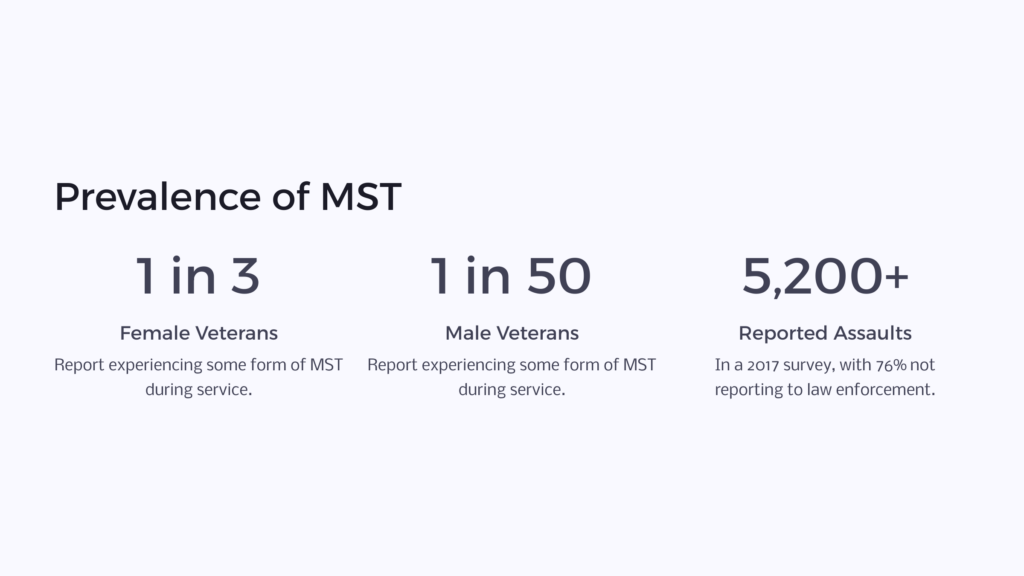
One 2017 survey revealed that more than 5,200 service members reported a sexual assault during their time of military service. Of those, 76% did not report the military sexual assault to law enforcement, citing fear of retaliation as the reason for remaining silent. Others reported feeling that the investigation process would not be fair and that ultimately no action would be taken about the MST-related behavior.
Common Reactions to Military Sexual Trauma
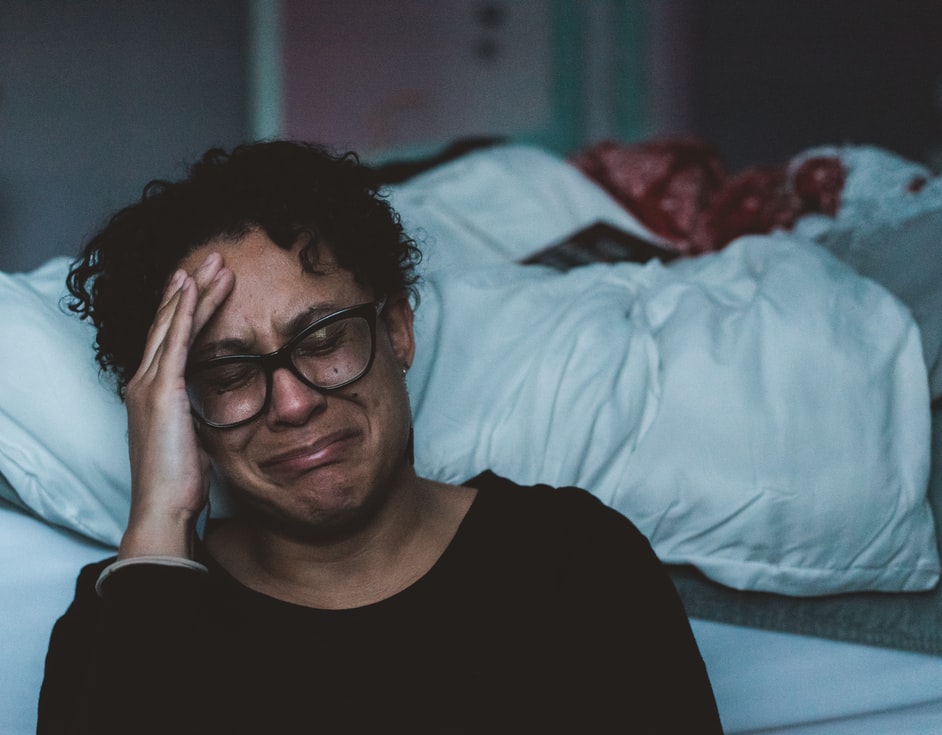
Reactions to military sexual trauma can vary widely among victims. Keep in mind that MST describes a traumatic experience, not a medical diagnosis. Trauma responses vary greatly from person to person.
While many people recover without professional help, others may generally function well in their lives while continuing to experience some level of trauma or exhibit strong reactions in certain situations. For some people, the experience of military sexual trauma may continue to shape their mental and physical health in significant ways, even many years later.
In general, the type, severity, and duration of an individual’s trauma response will all vary based on factors like whether the MST survivor has a prior history of trauma, the type of support the survivor received from at the time the trauma occurred, and whether the military sexual trauma happened as an individual occurrence or was repeated over time.
For those who struggle with health challenges following a military sexual assault experience, symptoms may include:
- Feeling depressed or having sudden, strong emotional responses to various triggers
- Feeling numb, flat, irritable, or angry
- Trouble sleeping
- Experiencing panic attacks
- Having trouble concentrating
- Feeling on-edge or jumpy
- Challenges with drug or alcohol abuse
- Feelings of isolation and physical symptoms ranging from weight gain to chronic pain
Many veterans who have been subjected to military sexual trauma have been known to develop specific physical health issues ranging from chronic pulmonary disease to liver disease and hypothyroidism. Others may question their gender identity or sexual orientation. In the very worst of cases, victims may engage in self-harm and/or experience thoughts of suicide.
In addition, post-traumatic stress disorder (PTSD) is commonly associated with MST, but it is not the only mental health condition that can follow a military sexual trauma.
The diagnoses most frequently received among users of VA health care after an MST experience are depression and other mood disorders, and substance abuse disorders. In addition, veterans who suffer military sexual trauma may struggle with developing and maintaining healthy relationships and healthy social functioning.
When left unaddressed, MST can result in tremendous mental and physical health challenges. The good news is that survivors can healthfully recover from this type of psychological trauma, and the VA offers resources to help put sexual assault survivors on a path to healing.
4 MST-Related Services Provided by the VA
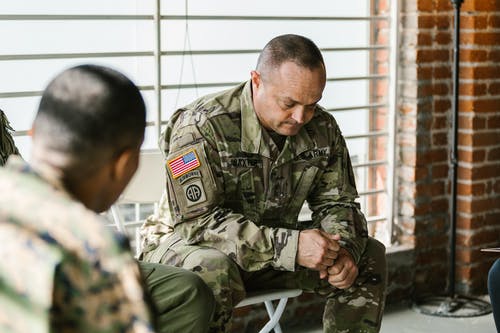
The VA offers several different resources to help veterans cope with MST. Let’s take a closer look at some of the veterans’ benefits the VA offers to help veterans deal with military sexual trauma.
Designated MST Coordinator
Each VA health care system features a designated MST Coordinator who serves as a chief resource for all MST-related issues, along with advocating for victims. This individual can help victims find and access VA services and programs that will be most helpful for them.
To find out more, you can contact the VA health system that serves your area. If you’ve experienced military sexual trauma and aren’t sure where to start in terms of getting help, your VA health system MST coordinator is an ideal place to start. Depending on your comfort level, you always have the option of requesting to speak with an MST coordinator of a specific gender.
If you’re already working with a VA health care provider, it also may be helpful, if you feel comfortable, to share with them that you experienced a military sexual trauma.
All VA primary care and mental health providers have completed extensive training on the treatment needs of those who have suffered military sexual trauma. Your VA provider may be able to recommend treatment referrals and additional support.
Outpatient Counseling
If a veteran seeks outpatient counseling to help process a response to military sexual trauma, many outpatient counseling programs offer programs that veterans find helpful. MST-related outpatient services are offered at any VA medical center, along with many VA community-based outpatient clinics.
The types of services available may include psychological assessment and evaluation, medication evaluation and treatment, and individual and group therapy. MST-related outpatient counseling is also available through the VA’s network of community-based Vet Centers.
Other programs offer specialized sexual trauma treatment in residential or inpatient settings for victims that need more personalized and comprehensive therapy.
Some inpatient programs also focus specifically on MST or have specialized MST tracks for treatment – and other inpatient programs are equipped to address acute care needs, like medication adjustment or psychiatric emergencies and stabilization.
Free Medical Treatment
All medical treatment for any physical and mental health condition related to experiences of MST is provided free of charge – this free treatment is not tied to a specific disability rating, and most veterans are eligible for free medical treatments related to military sexual trauma, even when they don’t qualify for other VA health benefits.
No documentation of the specific MST incident(s) is required, nor is previous reporting of any MST experience. Veterans do not need to show a minimum length of service or meet any income requirements to receive these free services.
Services at Vet Centers
Many services for those who have experienced military sexual trauma are available at any VA medical center. MST-related counseling services also typically are available through community-based Vet Centers. Community-based Vet Centers typically employ specifically trained sexual trauma counselors who can help counsel sexual assault victims.
Can I Get VA Disability Benefits for MST?
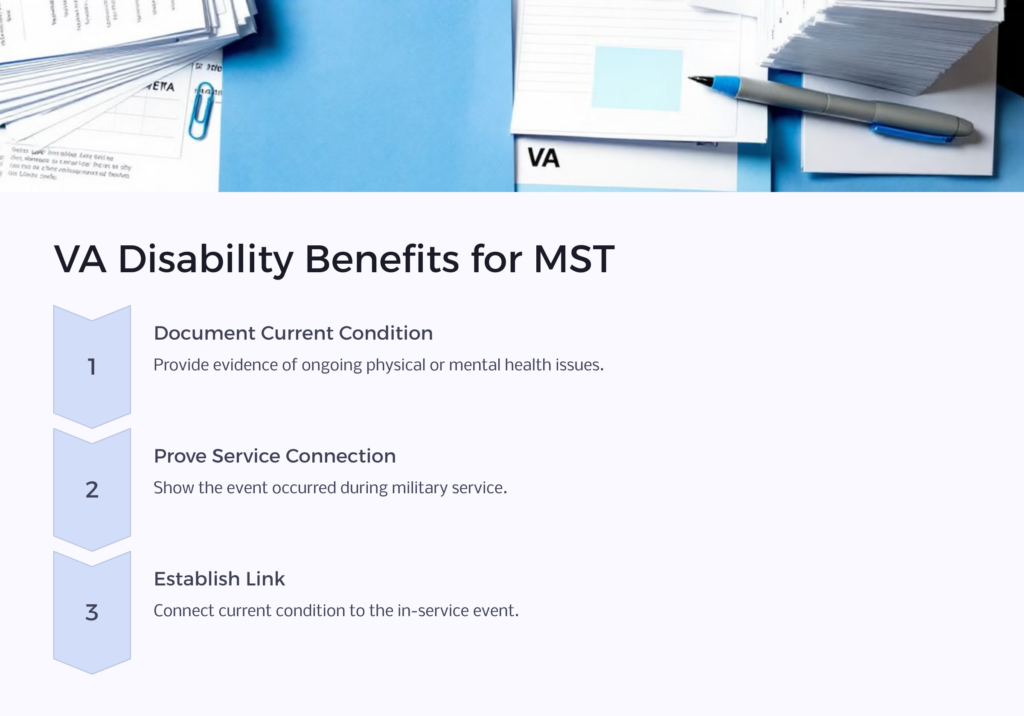
Yes, it’s possible to receive disability compensation for MST, particularly if a military sexual trauma leads to specific physical or mental health challenges. Veterans can typically receive a disability rating for medical conditions that either began or became worse during the time of military service.
This may include some conditions related to military sexual trauma. The MST coordinator at your local VA health care system likely can help you determine whether your situation may qualify.
Please remember as well that, as a U.S. veteran, you are eligible to receive free service related to treating the after-effects of military sexual trauma, no matter whether you qualify for VA benefits as a result. Your application for VA disability benefits is separate from your ability to access free MST treatment.
To file a disability claim with the VA for an MST-related medical condition, the veteran must provide the following:
- Documentation of a current physical or mental condition
- Documentation of an event, injury, or illness that occurred during military service
- Documentation that links the current disability or medical condition with the event, injury, or disease that occurred during the time of military service
For VA disability benefits claims specific to military sexual trauma, a veteran commonly may provide additional documentation such as Department of Defense sexual assault or harassment reporting forms or investigative reports completed during the time of military service.
Veterans suffering from PTSD or another mental health condition related to military sexual trauma may be allowed to submit indirect sources of evidence as part of their disability claim. Such sources of evidence may include specific behavioral events, patterns of changed behavior over time, or circumstances that provide evidence that the traumatic event happened.
Examples of the type of documentation to submit include:
- Documented changes in work performance
- Sudden onset of depression or anxiety
- Excerpts from diaries or journals describing a victim’s mental state
- Requests for transfer to another military unit
- Records from civilian sources such as hospitals, physicians’ offices, clinics, counseling centers, law enforcement agencies, or domestic violence centers
- Statements from clergy members, military chaplains, roommates, family members, and counselors
When evidence such as this is submitted, the VA may require an independent medical opinion to help define how these indirect sources support a diagnosis of MST-related effects, along with any other psychological trauma or mental health symptoms.
The VA will schedule an appointment for you to meet with a physician who will provide an independent medical opinion. If the veteran would prefer meeting with a physician of a particular gender, that request can be made when the appointment is scheduled.
It’s important to note that the VA has made a concerted effort in recent years to improve its processing and evaluation of MST-related claims. The VA has implemented specialized training for team members who work on military sexual trauma-related claims, ensuring that they have the subject matter expertise they need to evaluate these claims properly.
Any U.S. veteran who wishes to file a claim for VA disability compensation, MST-related or otherwise, may do so online. You also may appoint an accredited VSO or a Veterans Benefits Association MST outreach coordinator to help file your claim.
Recovering From Military Sexual Trauma

Although military sexual trauma can be a profoundly difficult experience, recovery is possible, and it’s never too late to move in a positive direction.
The U.S. Department of Veterans Affairs offers an array of effective services that can help support many different paths to healing from the repercussions of military sexual trauma. These services are recovery-oriented and tailored to a veteran’s specific needs.
The important thing is to reach out for help. If you have experienced MST, please speak with your existing VA health care provider or your local MST coordinator. You also can reach out to your local Vet Center or call the VA’s general benefit hotline at 1-800-827-1000.
 Benefits.com Advisors
Benefits.com Advisors
With expertise spanning local, state, and federal benefit programs, our team is dedicated to guiding individuals towards the perfect program tailored to their unique circumstances.
Rise to the top with Peak Benefits!
Join our Peak Benefits Newsletter for the latest news, resources, and offers on all things government benefits.















